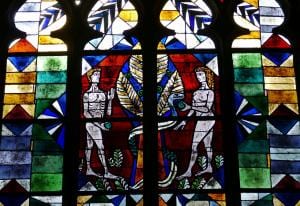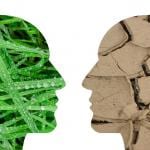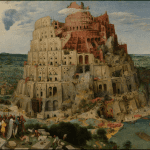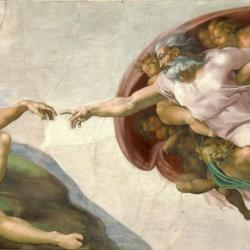[This is essay #4 – the final one – in a series entitled, “Original Sin and Karma”]
Introduction
In the play, Hamlet, an officer in the Palace Guard famously opined, “Something is rotten in the State of Denmark.” If he had been more aware of the human condition in general, he might have said, “Something is rotten in the state of the world.” And, indeed, it is. This issue of human vicissitude is probably the most oft-treated theme in world literature. The writers of all scriptures get into it; so do the philosophers, metaphysicians, psychologists, playwrights, novelists – and Calvin and Hobbes. And I’ve had a shot at it myself. I’ve looked at it through the twin lenses of karma and original sin, in these four brief essays.
Original Sin
A.The Biblical Version – Genesis chapter 3
The Judeo-Christian scriptures, after two slightly-conflicting accounts of creation (Gen 1 & 2), very quickly knuckle down to wresting with the question of human suffering, and our apparent alienation from God. And they did it in the most trusted and tried method ever devised by us – they told a story whose real importance is neither its historical veracity nor, yet, its judicial fairness but, rather, its colorful explanatory power. Because, ultimately, we can survive – nay, even thrive – in any situation in which we can overlay meaning, as Viktor Frankl, Aleksandr Solzhenitsyn and countless others have realized. The biblical writers were keen observers of the human condition and their objective was to provide a narrative to the suffering populace that made sense and gave hope to ‘John-Smith-on-the-street’ (make that Joseph-ben-Yehuda-on-the-donkey.)
So, how to account for the travails of childbirth, the difficulties of agriculture for clue-less desert nomads who had just recently become farmers, the reality of patriarchy, and our fear of snakes?! In one brilliant little vignette, they gave answers to all of those questions.
But kids grow up, civilizations evolve, and soon the folktales and fairytales have to be re-engineered and re-interpreted. We have to be really careful not to throw the baby of wisdom out with the bathwater of storytelling. I have a sister, Dearbhla (pet name, Della) who is 22 years younger than me. She was only three years old when I left for my first tour as a missionary in East Africa. I would come home every three years and she would beg me to tell stories from the mythologies of the world. And I did so. They filled her soul with wonder as her eyes widened and her mind travelled in foreign climes. Then she went to college and took a Masters in Sociology. Thereafter, we would revisit all the old tales and harvest them for their inner wisdom and their powerful relevance to new times and new circumstances. The beauty of stories – as Jesus was well aware – is that the same ancient fable can be freshly unpacked to shed light on current events: ‘the little story that could.’
So, what do I think today about our exile from the Garden of Eden? Obviously, the ‘original sin’ was not about a pre-rational couple being tempted by a slithering snake to eat a piece of fruit. Rather, it was about the gradual exercise of the gift of freewill in the employ of service-to-self and, thus, to the slide out of alignment with the Divine Order of the Cosmos. Original sin and karma were born at the same time. But birth ripens into the ‘terrible two’s’, into the addiction of the toddler to words like, “me”, ‘mine” and “no!” It further hardens into teenage rebellion and, eventually, into crabby, pessimistic ‘old age.’ And that is why there is a promise built into the Genesis story – of redemption, an awakening, a conquest of selfishness, a move towards compassion and service-to-others; in other words, Christ Consciousness.
This misalignment with the Divine Order quickly resulted in the first murder. In the scheme of things, a single murder wouldn’t make even the back page of a newspaper today. But this one was different. Not only did it set the template for all subsequent murders, it wiped out 25% of the human race. There were only four people on the planet at the time: Adam and Eve and their sons, Cain and Abel. When Cain killed his brother, it left only three humans alive, two males and one female. Not a very auspicious start to ‘project human.’ Maybe some of it was God’s own fault; his behavior in dumping Adam and Eve out of the garden for a single transgression and barring the gates of paradise to all of their progeny wasn’t exactly the kind of reaction that might inspire gentleness and brotherly love in Cain. Of course, as I said earlier, these were simple stories to explain complex situations; and the volatile divinity of Genesis is not God, he is the coagulated projections of human behavior. The original sin, therefore, was neither about apple-eating nor divine anger but the gradual use of freewill to widen the gap between alignment and misalignment.
B. The Theological Version – St. Augustine
As a convert to Christianity from a rakish, promiscuous lifestyle, Augustine had a fairly simplistic explanation for the very real impediments we experience. He lived at a time (circa 400 CE) when the Roman empire was coming under increasing pressure from the Vandals of northern Europe. Augustine regarded Roman law and society as the apex of civilization; almost as the image of God. On the other hand, the irrational, barbaric behavior of their enemies was as far from godlike as it is possible to go. He then made a mighty leap: at the moment of orgasm, a couple is most irrational, most out of control and, therefore, most un-Godly. And it is at that precise moment that a child is conceived. Thus, each zygote (though he didn’t use that word) is saddled with this ‘original sin.’ I wonder what he’d say about a child conceived via in-vitro fertilization?
In any case, he then went on to say that there are three grave consequences of being ushered into incarnation though sexual activity. First, our will is weakened. He’s right on, there! We are addicted in so many ways as individuals – and, indeed, as a global community – to substances, relationships, anger, warfare and divisive memes. We repeat dumb mistakes at every level – from smoking, all the way to spending billions of dollars on creating weapons of mass destruction. How many cancer deaths will it take to stamp out smoking? How many holocausts will it take before we dismantle our WMD’s? Those who do not learn from history are destined to repeat it; and those who do not learn from the repetition of world-wide wars are destined for extinction.
The second consequence of original sin, said Augustine, is that our intellects are darkened. It is obvious, even to the most casual of observers, that we have a very limited ability to appreciate the cosmic plan or the divine will. Neither science nor psychology, for instance, can even define what ‘consciousness’ is! And the very best that materialistic science can offer us is the Big Bang and a meaningless universe that, miraculously, appeared ex nihilo in a lucky sequence of random occurrences. Theology, for its part, particularly in its ‘orthodox version’, has given us a volatile God, who plays favorites, and thinks nothing about condemning most of his human children to the everlasting flames of hell. How dark can the intellect get!
And the third result of original sin, Augustine said, is that our bodies are subject to illness and death. He’s batting 1,000 on that one. Of a cumulative total of 111 billion humans who’ve ever lived on planet Earth, 104 billion have died, and things ain’t lookin’ so rosy for the rest of us. In fact, in comparison to many of the ‘lower lifeforms’ we humans have a very short shelf life. For example, turtles can live for 180 years, sea urchins for 200 years, the Greenland shark for 400 years and some varieties of ocean clams up to 500 years. Maybe, these guys have very rational, controlled orgasms.
C. My own theory of original sin
I believe that original sin is a tapestry woven of three strands, rather like a Celtic knot. Let me quickly enumerate them and then go into more detail on two of them. First is personal karma. If I were to butcher Wordsworth, I would say, “trailing clouds of karma do we come…” I went into detail on this in my first essay of the series. In brief, we are carrying the karma of our individual histories throughout all of our lifetimes. Second, we arrive into a world which is contaminated by the karma of all Earth life that existed before us, including the previous incarnations of all current lifeforms on the planet and how that past karma is affecting their current behavior. And, third, we are born into physical bodies that evolved from our non-human animal ancestors. At every stage of that 3.7-billion-year journey, our forebears were selfish and they frequently resorted to killing in order to gain access to resources – territory, food and mates. As illustrated in the Gombe Chimpanzee War, this sometimes involves blood-thirsty boisterously-celebrated genocide. So, we inhabit spacesuits that have billions of years of murderous behavior encoded genetically and epigenetically in our DNA.
Before even self-awareness, freewill or sentience entered the evolutionary equation, pre-programmed instincts and predispositions enabled a wide variety of species to colonize and kill. Plant parasites, like mistletoe, suck the life out of other plants while contributing nothing to their ‘hosts’. Where I live, a non-native plant called, Scotch Broom, is conquering the open spaces, smothering native species in the process. In the 26 years I’ve lived in my forest home, I’ve actually watched the Scotch Broom march, mile by mile, along the dirt road, capturing all available space. Plants even turn carnivorous. The Venus Fly Trap, a colorful seductress, invites flies and insects into its open mouth only to snap it shut when a visitor arrives, and then slowly digest the guest.
Higher up the chain, sharks eat all manners of fish. They even operate as a team herding shoals of fish into the shallow waters off the north coast of Australia, the better to assuage their hunger. When aquatic life became amphibious e.g., crocodiles, they learned to drag migrating wildebeest into the water, drown them and eat them. In turn, jaguars in South America, have been videotaped jumping into crocodile-infested waters, grabbing one, dragging it ashore and feasting on it. From dinosaurs to mammals to hominids, we find this same system of predator/prey. Whether it’s different species e.g., lions, leopards, cheetahs, hyenas, jackals or dingoes, competing for the same resources e.g., gazelle, zebras…; or species for whom another species is the resource e.g., hawks and sparrows, our planet seems to be equal parts symbiosis and strangulation (plant life), cooperation and competition (animals) and creativity and killing (humans).
Advanced as we are, we still carry the reptilian brain and the mammalian brain tucked resourcefully behind the very recently-acquired neocortex. Original Sin is still calling the shots. But it contains, within its deepest shadows, the Original Blessing which can only be midwifed by Christ consciousness.













